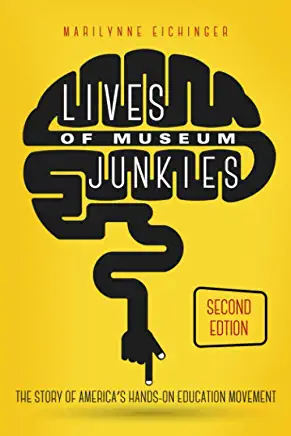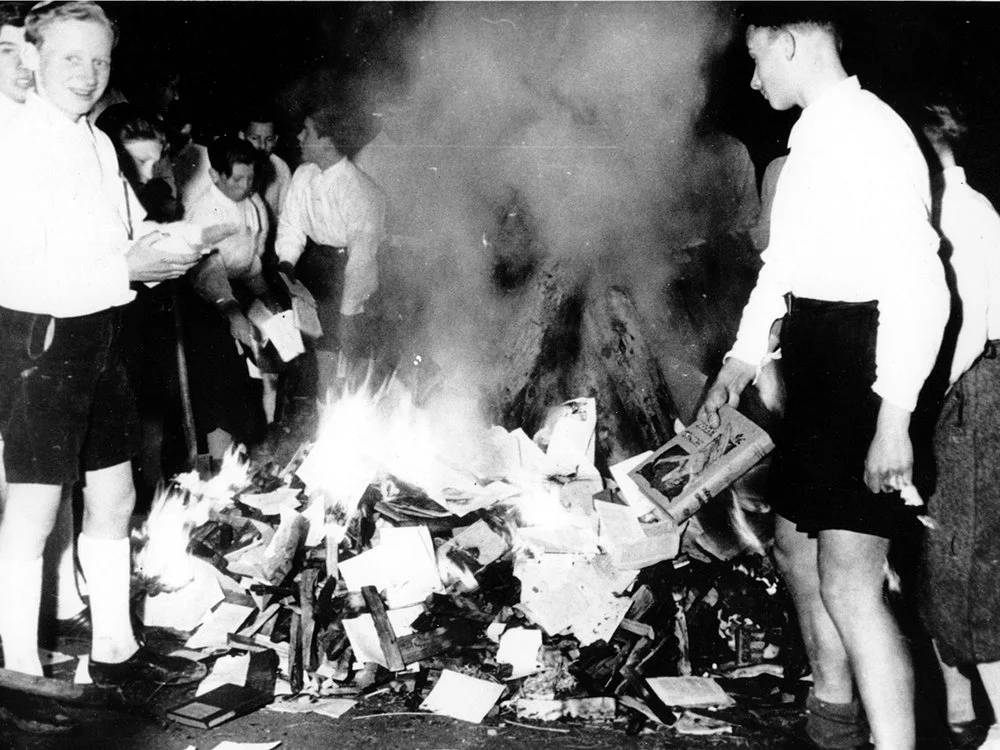

Though there are stories of rape in Lives of Museum Junkies and Over the Peanut Fence explains what happens when LGBTQ youth are sent from their homes, these books aren’t yet banned. You can find them in bookstores and on Amazon in paperback and ebook formats. You might want to purchase them before it’s too late.
Book Burning? “Who kills a man kills a reasonable creature…but he who destroys a good book, kills reason itself-” John Milton, author of Paradise Lost wrote in his 1644 book Areopagitica.
Oh, no–not again! Banning books has a long dark history, spanning every continent. Still, it is surprising to see it happening again. Unfortunately, Florida, Texas, and other conservative states are doing just that. Totalitarian regimes throughout history are the ones that target culture. I fear the United States is headed in that direction. White and Christian nationalism has spurred action that belies the founding documents that assure us freedom of speech, the press, and worship.
In Germany, the Nazi German Student Association declared war on the Un-German Spirit, and in 1933 initiated public purges by fire. Under a symbol of intolerance and censorship, works of Jewish, liberal, and leftist writers went up in flames. Joseph Goebbels gave a speech shouting! No to decadence and moral corruption! Yes to decency and morality in a family state!” Among those on their blacklist were Ernest Hemingway, Karl Marx, Bertolt Brecht, Thomas Mann, Jack London, Helen Keller, and Theodore Dreiser.

Hitler Youth members burn books, 1938 – (Smithsonian Magazine)
Over thousands of years, libraries and books have been targeted by all ethnicities. This wasn’t the first time books were burned in Germany. In 1817 students got rid of anti-national and reactionary texts and literature they too thought to be “Un-German.” Years later, in 2012, al-Quida Islamists invaded Malii and then Timbuktu, destroying priceless manuscripts. Thankfully Abdel Kader Haidara and others risked their lives smuggling out 350,000 manuscripts.
To gain greater control over his people, the Chinese emperor, Qin She Huang, ordered a bonfire of books. Poetry, philosophy, and history went up in flames so a comparison wouldn’t be made between him and other rulers. When Mao Zedong took power, the cultural revolution destroyed books that didn’t conform to party propaganda. Australia banned books like Brave New World and Lady Chatterley’s Lover.
A long list of emperors and leaders threatened by the ideas of others felt themselves to be victims of malicious writings. In Livy’s History of Rome, he writes that Bacchanalia (200-150 BC) outlawed writings to prevent disorder and the spread of foreign customs. The Catholic church burned books and manuscripts along with heretics who attacked church doctrine and practices like indulgences and cosmological readings. More recently (1981), the Jaffna Public Library of Sri Lanka, home to 100,000 rare books of Tamil history and literature, was burned by Sinhalese Buddhists. Though they outnumbered the Tamils, the Buddhists felt their beliefs were under threat by the Hinduism of the Tamils.
Unfortunately, many of today’s leaders are too weak to allow divergent viewpoints to circulate. They feel threatened and compelled to wipe writing they disagree with from the historical record. Over the past century, To Kill a Mockingbird, The Autobiography of Benjamin Franklin, Bury My Heart At Wounded Knee, and A Separate Peace have all been subject to bans. So have the works of children’s authors J.K. Rowling and Judy Blume.
Under President George W. Bush, EPA libraries were threatened with closure. In 2014, Canadian Prime Minister Stephen Harper locked away or destroyed scientific research documents. Scientists working for Fisheries and Oceans were prevented from doing science. Their knowledge was purposefully taken from the public.
Power is scary when it allows someone to negate others’ beliefs and put into effect their own logic as though they were a god. Historian, Barbara Tuchman, warned in her 1980 address at the Library of Congress, “Books are the carriers of civilization. Without books, history is silent, literature dumb, science crippled, and thought and speculation at a standstill. Without books, the development of civilization would have been impossible.”
Today’s bans are aimed at the LGBTQ community and race. States like Florida are prohibiting teachers to discuss black history before 1965. Gay, lesbian, and transvestite issues are not to be mentioned. Florida is not alone in negating history and biology. There were 2,532 instances of book bans across the nation between July 2021 and June 2022 and over 100 bills were initiated at the state level to censor them.
Book bans are devastating to authors and gay teens who see the community treat them as being abnormal. Banning denies students the right to receive a culturally and biologically relevant education. Youth need to be given a broad spectrum of information and learn how to analyze issues that are raised. They are our future lawmakers and their minds have to be open to change. By 2040, white people will no longer account for the majority of the U.S. population. White supremacy is bound to fail in the end. Whether it will do so without bloodshed remains to be seen.
The first amendment guarantees freedom of thought and expression. If you advocate for this freedom, speak out and fight against censorship tactics. If you hear of censorship, contact the local press to write about it. Show up at meetings where decisions are being made. It may be a PTA meeting, a school board, or a public event. Whatever you do, make your voice heard. People, including students, need a balanced perspective to make objective decisions. Books are a way to unite us in freedom, while censorship is divisive.
Suggestions to combat censorship: Read a banned book. Speak out publicly. Host a banned books party. Volunteer at your local library. Join your library or school board so you’ll have a seat at the table. Contact the press and let the public know what is happening.
Isn’t this supposed to be the land of the free and the home of the brave? _________
For those interested in knowing more, the following information was taken from an article in The Daily Beast.
Five Book Ban Trends to Watch in 2023
1. Laws to limit access to information. Since the summer of 2022, Florida schools have been removing books with LGBTQ+ content under threat of punishment from what critics have dubbed the “Don’t Say Gay” law. In Missouri and Utah, new laws concerning the distribution of material deemed “harmful to minors” have led schools and librarians to cull their collections, scuttling away books with any nudity or sexual content
2. Changed policies making book banning easier. One Pennsylvania district passed vague rules last summer about what kinds of books can be purchased. In the fall, a Texas district passed a prohibition on all books that discuss “gender fluidity.” In Florida and South Carolina, districts have suspended access to slates of books when challenged, then rewritten their policies to justify such bans retroactively. And in Tennessee, a politically-appointed commission will soon have the power to ban books across the state’s schools, and some commission members do not want to have to read the books before banning them.
3. Activists are equating all sexual content with pornography. The pressure to root out such content appears to be working, as some schools and librarians have determined that even classic works like The Handmaid’s Tale or The Bluest Eye, or books about puberty like It’s Perfectly Normal, are somehow indecent materials that lack value for minors because they have sexual content. This dragnet is sweeping up memoirs and works of fiction that might teach young adults about consent, sexual assault, or date rape-and parallel new efforts in some states to censor education about abortion.
4. Censorship efforts are intensifying at public libraries. Though schools are at the epicenter of a movement it is spreading to public libraries. In numerous states libraries have been facing demands to remove lists of books, and to ban LGBTQ-themed books, displays, and content in children’s sections. When one Michigan library refused to ban a handful of LGBTQ+ books, local citizens mounted a campaign and voted to stop funding it.
5. Proposals to regulate books are getting more extreme. The city council in League City, Texas, for example, recently voted to prohibit purchasing, displaying, or stocking books with certain content from any public library. In doing so, they are empowering local governments to dictate what books all citizens can freely access. Likewise, in Texas and Oklahoma, bills recently introduced would require new age ratings for books, which would be used to strictly police their public availability. Unlike rating systems for movies or music which are industry-driven, the Texas proposal would give the state new authority to set and enforce these ratings. Publishers that don’t comply would lose access to the state’s public school market entirely.
References:
Oliver, D. (2023) What happens to our culture when books are banned: ‘A chilling effect’. USA Today. retrieved from https://www.usatoday.com/story/life/health-wellness/2023/02/22/book-bans-what-happens-culture/11262643002/
Holocaust Museum website. (2-23) Book Burning. Holocaust Encyclopedia. retrieved from https://encyclopedia.ushmm.org/content/en/article/book-burning
Boissoneault, L. (2017) A Brief History of Book Burning, From the Printing Press to Internet Archives. Smithsonian Magazine. retrieved from https://www.smithsonianmag.com/history/brief-history-book-burning-printing-press-internet-archives-180964697/
Rogerson, K. ( 2023) The State of Book Bans in the US win 2023. Lit Reactor. retrieved from https://litreactor.com/columns/more-the-state-of-book-bans-in-the-us-in-2023
Friedman, J. (2023) Here are 5 book Ban Trends to Watch in 2023. Daily Beast. retrieved from https://www.thedailybeast.com/here-are-five-book-ban-trends-to-watch-in-2023
Kuabo, Rakuten, (2023) Banned Books Week: 18 Ways to Help & Advocate (2023) retrieved from https://www.goodgoodgood.co/articles/banned-books
